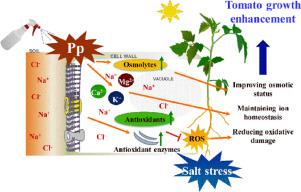Scientia Horticulturae ( IF 4.3 ) Pub Date : 2021-12-03 , DOI: 10.1016/j.scienta.2021.110779 Weiwei Zhou 1 , Wenlong Zheng 1 , Weixuan Wang 1 , Haofeng Lv 1 , Bin Liang 1 , Junliang Li 1

|
Soil salinity is one of the major environmental threat for sustainable agriculture. Animal protein hydrolysates, as plant biostimulants, have received increasing attention because of their positive impacts on crop performances. However, their functions in crop tolerance to salt stress are unknown. We investigate the feasibility of pig blood-derived protein hydrolysates (Pp) in improving salt tolerance in tomato and the underlying mechanism. Pp application effectively ameliorated the salt stress-induced reduction in plant growth, chlorophyll levels, and photosynthetic efficiency. Salt-induced osmotic stress was indicated by lower relative water content, where higher Na+/K+ ratio indicated the ionic toxicity, whereas these phenomena were alleviated by Pp application, which might be due to the increased proline, soluble protein, sugars, K+, Ca2+, and Mg2+ contents. Salt stress also caused a significant increase in oxidative stress, as indicated by the enhanced H2O2 and O2− generation, malondialdehyde content and electrolyte leakage, which were mitigated significantly by Pp application via enhanced antioxidant enzyme (CAT, POD, and SOD) activities and the levels of non-enzymatic antioxidant including GSH and phenolic compounds. Pp application effectively enhanced tomato salt tolerance by regulating osmolytes biosynthesis, ion homeostasis, and antioxidant system responses. Thus, Pp may be proposed as effective methods to help plants overcome salt stress situations in agriculture.
中文翻译:

外源猪血蛋白水解物是缓解番茄盐胁迫的一种有前景的方法(Solanum lycopersicum L.)
土壤盐分是可持续农业的主要环境威胁之一。动物蛋白水解物作为植物生物刺激素,因其对作物生长的积极影响而受到越来越多的关注。然而,它们在作物耐盐胁迫方面的功能尚不清楚。我们研究了猪血来源的蛋白质水解物 (Pp) 在提高番茄耐盐性方面的可行性及其潜在机制。Pp 应用有效地改善了盐胁迫引起的植物生长、叶绿素水平和光合效率的降低。盐诱导的渗透胁迫表现为较低的相对含水量,较高的 Na + /K +比率表明离子毒性,而这些现象通过应用 Pp 得到缓解,这可能是由于脯氨酸、可溶性蛋白质、糖、K +、Ca 2+和 Mg 2+含量增加。盐胁迫也导致氧化胁迫显着增加,如增强的 H 2 O 2和 O 2 -通过增强抗氧化酶(CAT、POD 和 SOD)活性和非酶抗氧化剂(包括谷胱甘肽和酚类化合物)的水平,应用 Pp 可显着减轻丙二醛的产生、丙二醛含量和电解质泄漏。Pp 应用通过调节渗透物生物合成、离子稳态和抗氧化系统反应,有效地增强了番茄的耐盐性。因此,Pp 可能被认为是帮助植物克服农业中盐胁迫情况的有效方法。



























 京公网安备 11010802027423号
京公网安备 11010802027423号